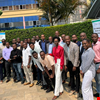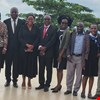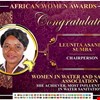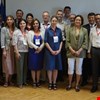
/ Eastern Africa
African Blue Deal partners meet to set steps forward for sustainable financing of IWRM, 7 until 12 July 2024 in Mombasa, Kenya
GWP Eastern Africa Regional coordinator George Sanga joined participants from the Netherlands and 7 Africa countries (Burkina Faso, Eswatini, Ethiopia, Ghana, Kenya, Mozambique, and South Africa), and Dutch Blue Deal partners for a workshop on sustainable financing of Integrated Water Resource Management. He shared the GWPEA experience with implementing the SDG6 IWRM Support Program on how the Blue Deal program can replicate the Matchmaking Initiative pilot in Kenya to mobilize financial resources in target countries.
These topics of water pricing, nature-based solutions, financial opportunities were discussed and an interesting excursion gave insights into the challenges of a local WRUA (Water Resources Users Association) in implementation of a Mangrove restauration project on the shores of the Indian Ocean.

/ Eastern Africa
Seven countries geared to become international models for water leadership
Seven African, Middle Eastern and Asian countries have laid the foundation to becoming international models for water leadership after implementing a 3-year Global Water Leadership in a Changing Climate (GWL) Programme that helped them identify major challenges in water resources and services management as well as develop strategies to resolve them.

/ Eastern Africa
Global Water Leadership Programme develops Response Strategies to address challenges in Intergrated Water Resources Management and WASH in Eastern Africa (Rwanda and Uganda
GWPEA successfully completed Global Water Leadership Programme in Rwanda and Uganda in March 2024

/ Eastern Africa
Leveraging Water for Peace and Prosperity: The launch of the Response Strategy for Strengthening Water Resilience in Rwanda
The Global Water Leadership Program-Rwanda launched a response strategy aims at strengthening water resilience in Rwanda in the event held on 22 March 2024 at Radisson Blu Kigali. This event, coincided with the celebration of the 2024 World Water Day themed “Leveraging Water for Peace and Prosperity” brought together representatives from various government institutions, international organizations, regional and national institutions.

/ Eastern Africa
GWL PROGRAMME-RWANDA DEVELOPS A RESPONSE STRATEGY TO ADDRESS THE BOTTLENECKS THAT ARE IMPENDING IWRM AND WASH IN RWANDA
By Theobald Bizuhoraho, Project officer, GWL Rwanda-
Musanze District, Rwanda – August 3, 2023
/ Eastern Africa
EURECCCA Project closes, Increases Resilience of Communities to the risks of Floods and Landslides in Uganda.
The EURECCCA project set out to increase the resilience of ecosystems by supporting sustainable management of forests, wetlands, and riverbanks and to increase the resilience of agricultural landscapes by supporting communities to develop and implement sustainable water harvesting, soil bio-physical and flood control structures.
/ Eastern Africa
GWPEA lays foundation for strategic partnership
Since its inception in 2003, GWPEA has partnered with various organizations to address water security issues in the Eastern Africa and Nile Basin region. As a custodian of integrated water resources management (IWRM) in the Region, GWPEA draws on 20 years of multi-level implementing experience, enabled by a functional interface with global development agendas, leadership, and finance flows.

/ Eastern Africa
Review of the Gender Checklist and Mainstreaming Gender in IWRM
The aim of the exercise is to test the checklist in a stakeholder consultation setting and to collect feedback from national stakeholders’ key aspects of Gender mainstreaming in IWRM.

